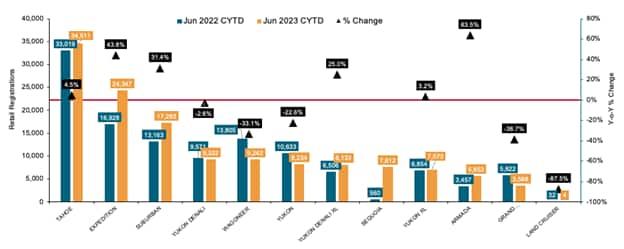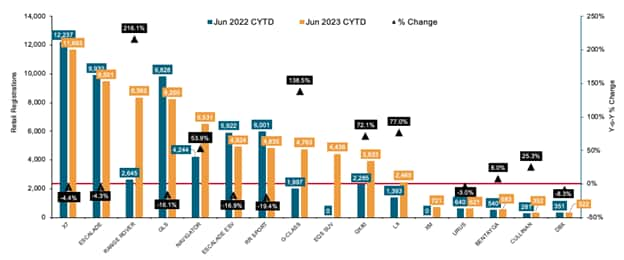US consumers going big as full-size SUVs gain share

[ad_1]
As US auto sales recover to pre-pandemic
levels, full-size SUVs are racking up notable gains.
When vehicle inventories skidded during the
pandemic and semiconductor crisis, automakers switched focus to
concentrating on high-profit segments. In the case of the Detroit
3, that meant large SUVs, which saw substantial share gains. Now as
manufacturing and inventories return in earnest, will that share
growth be sustainable and translate into big volume gains as
well?
“We’re now in the fourth year after the initial
pandemic lockdown, and now those consumers are coming to the
surface with a desire to travel on the road,” said Tom Libby,
associate director for loyalty solutions and industry analysis at
S&P Global Mobility.
S&P Global Mobility projects US retail
sales at 15.4 million units this year, up from 13.9 million units
in 2022. From that total, registration data show total full-size
utilities leaping to 3.5% cumulative year-to-date share through
June, compared to a 1.9% level 10 years ago and 2.6% in 2019.
Mainstream full-size SUV share has risen from 1.2% a decade ago to
2.3% this year, while luxury models’ share has bumped up from 0.7%
to 1.2%.
FULL-SIZE MAINSTREAM SPORT-UTILITY SHARES
 Source: S&P Global Mobility retail
Source: S&P Global Mobility retail
registration data CYTD June 2023 vs 2022 ©2023 S&P Global
Mobility
In year-over-year registrations for mainstream
models, sharp increases have been posted by the Ford Expedition, up
43.8% to 24,347 units year-to-date through 1H 2023, and the
Chevrolet Suburban, up 31.4% to 17,293 units. The segment leader,
the Chevrolet Tahoe, rose 4.5% to 34,511 retail registrations.
Not that everyone is seeing success. The Jeep
Wagoneer is down 33.1%, and the Grand Wagoneer has fallen 38.7%,
while GMC’s Yukon has slipped by 22.6%.
However, the overall range of General Motors’
full-size SUV lineup – Chevrolet’s Tahoe and Suburban, and GMC’s
Yukon, Yukon XL, Yukon Denali, and Yukon XL Denali – give GM a vast
array of competitive full-size models, Libby said.
“They have a real strength in those higher-end
models,” Libby said. “No one offers that kind of breadth in utility
vehicles.”
In the luxury space, a newcomer appears to have
gained substantial traction, Libby says. The electric Mercedes-Benz
EQS registered 4,436 units through June, following its late-2022
launch. And while some of those sales likely came from Mercedes’
own GLS – which has taken a 16.1% hit to 8,250 units - overall
Mercedes-Benz full-size SUV sales have grown.
The rival BMW X7, however, has seen sales drop
4.4% to 11,693 units. Meanwhile, the Land Rover Range Rover
flagship has seized on strong owner
loyalty with its recent redesign to see its 1H 2023
registrations leap to third place among big luxury SUVs.
FULL-SIZE LUXURY SPORT-UTILITY SHARES
 Source: S&P Global Mobility retail
Source: S&P Global Mobility retail
registration data CYTD June 2023 vs 2022 ©2023 S&P Global
Mobility
LIGHT VEHICLE SALES FORECASTING
THE AUTO INDUSTRY SHARE
WARS WILL RESUME IN ’23
SUBSCRIBE TO OUR TOP 10
INDUSTRY TRENDS NEWSLETTER
POLK AUTOMOTIVE
AUDIENCES: CONSUMER MARKETING ANALYTICS
AUTOMOTIVE LOYALTY RATES
STALL DESPITE VOLUME INCREASES
SEPTEMBER AUTO INVENTORY
TRENDS
This article was published by S&P Global Mobility and not by S&P Global Ratings, which is a separately managed division of S&P Global.
[ad_2]